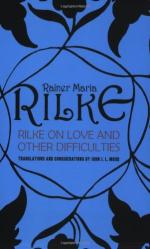
|
1. What does the commentator say regarding Rilke's feminism in the Prologue?
In his early reading of Rilke in the 1960s, Mood had discovered the depth and comprehensive lucidity of Rilke's feminism and views on love and the conventions thereof. He describes the influences of Rilke's friendships with feminists Ellen Kay and Lou Andreas-Salome, and describes Rilke's sensual and soulful writing about sex to be a poetic and spiritual act.
2. What does the commentator say regarding the transition to the 1960s' promiscuity and what this transition lacked?
In describing the genius of Rilke's voice, he cites Suzanne Lilar, who described a generation who passed in the '60s from Puritanism to promiscuity without ever having experienced genuine, deep sensual love, saying that this group is the one so badly in need of Rilke's wisdom.
3. What does Mood say in regard to Rilke's vision of Eros in the Prologue?
Mood includes an excerpt from Rilke in which he describes Eros as seen by Socrates, restless and frustrated between desire and consummate love, and concludes his introduction with questions about how modern humans learn to love with no adequate teachers. Mood's gathered essays are Rilke's written contemplation of that question - of how one may learn in Eros the lessons it has to teach about true and perfect love.
(read all 60 Short Essay Questions and Answers)
|
This section contains 3,914 words (approx. 14 pages at 300 words per page) |

|




